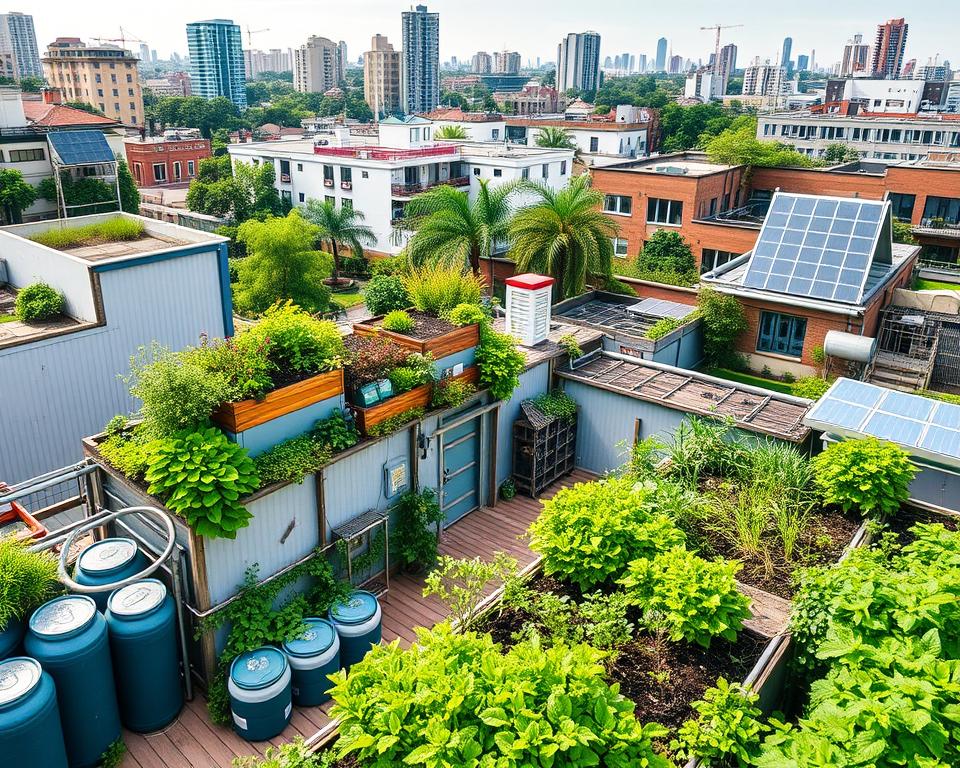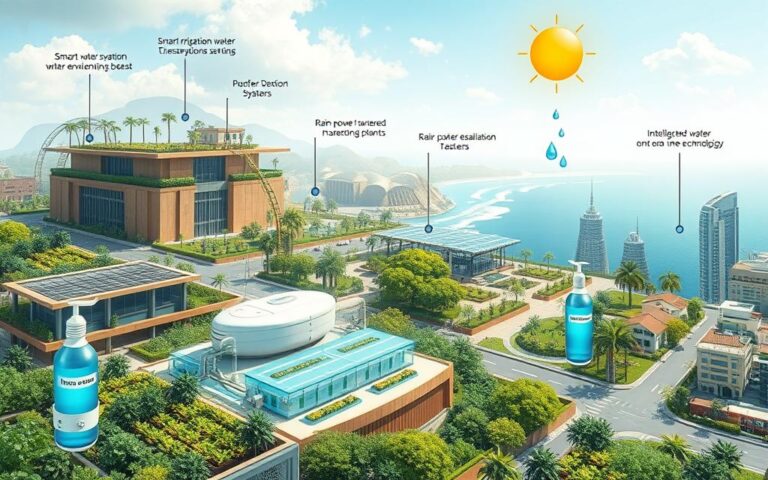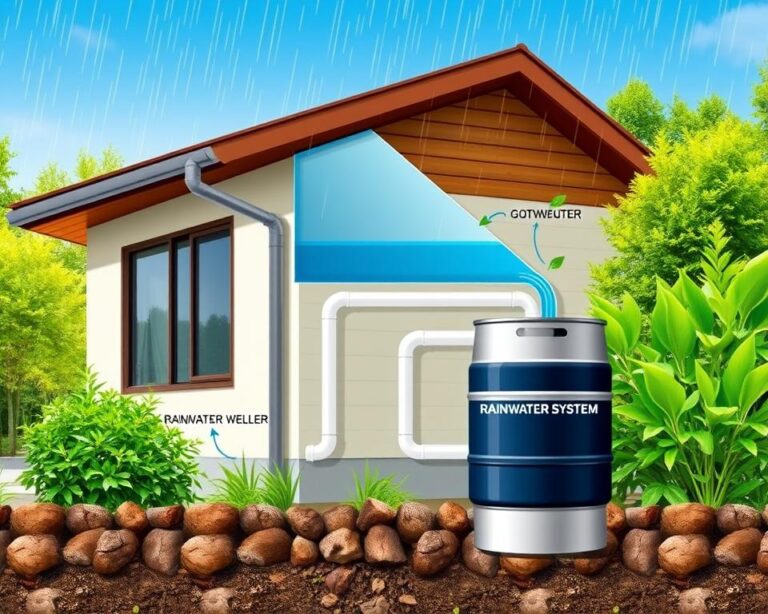Did you know treating wastewater and reusing it can greatly increase water resources? This is especially true in coastal areas with severe water shortages. As cities grow, finding new ways to recycle water is key for a sustainable future.
Cities across the U.S. are adopting eco-friendly water solutions. These efforts not only save water but also help protect the environment. This is a big step towards a greener future.
More people are learning about water recycling. It’s being used for everything from watering crops to flushing toilets in tall buildings. California is a leader, using over 724,000 acre-feet of recycled water in 2009. Exploring urban water recycling can benefit your home and community.
Understanding Water Recycling in Urban Settings
Water recycling is key in meeting urban water needs. It treats wastewater for reuse, offering a green solution for cities. Knowing about water recycling helps us see its value in today’s cities.
What is Water Recycling?
Water recycling, or environmental water recycling, cleans wastewater through several steps. This makes the water safe for non-drinking uses. Cities use less fresh water from rivers and lakes. Smith & Loveless has led in water reuse tech for over 40 years.
Advantages for Urban Life
Water reuse brings many benefits. It saves energy and money by using treated water instead of fresh. It also helps protect against water shortages caused by climate change. Plus, it keeps waterways clean, improving life quality.
| Advantages of Water Recycling | Description |
|---|---|
| Reduced Freshwater Dependence | Conserves natural freshwater resources by reusing treated wastewater. |
| Environmental Protection | Reduces pollution from untreated wastewater discharges into ecosystems. |
| Financial Savings | Decreases treatment and transportation costs associated with freshwater. |
| Enhanced Resilience | Helps urban regions adapt to climate change impacts and water shortages. |
Types of Water Recycling Practices
Learning about different water recycling practices helps us save water. These methods are key to solving water shortages and using resources wisely. Greywater recycling, rainwater harvesting, and blackwater treatment are some of the main ones.
Greywater Recycling
Greywater recycling uses water from sinks, showers, and washing machines. It’s great for city homes, saving clean water for irrigation or flushing toilets. First, the water is treated to remove harmful stuff, making it safe for non-drinking uses.
Rainwater Harvesting
Rainwater harvesting collects and stores rainwater, cutting down on stormwater runoff. It helps your property save water for irrigation, flushing toilets, and cleaning outside. Using rainwater also helps refill local groundwater.
Blackwater Treatment
Blackwater treatment is for sewage and very dirty water. It uses advanced tech like membrane bioreactors and reverse osmosis to clean the water. This makes it safe for reuse in farming, industry, and more, helping our water supply last longer.
| Water Recycling Practice | Source of Water | Primary Use | Treatment Requirement |
|---|---|---|---|
| Greywater Recycling | Sinks, showers, washing machines | Irrigation, toilet flushing | Low to moderate |
| Rainwater Harvesting | Rainfall | Garden irrigation, cleaning | Minimal |
| Blackwater Treatment | Sewage systems | Agriculture, industrial use | High |
These methods are crucial for managing water well, especially with water shortages getting worse. By using them at home or in our communities, we help ensure a sustainable future.
Implementing Water Recycling in Your Home
Turning your home into a greener space starts with simple water recycling. These eco-friendly solutions save natural resources and cut utility bills. Here are ways to set up recycled water systems at home.
Simple Steps for Greywater Systems
A greywater system uses water from sinks and washing machines. To begin, follow these steps:
- Check local laws on greywater reuse, as some places have rules.
- Install diverters to send washing machine water to your garden.
- Use safe cleaning products to protect your plants from harmful chemicals.
- Try a bucket method for shower water, using it for toilets or plants.
These steps can recycle 50 to 80 percent of your home’s water.
How to Set Up a Rainwater Collection System
Creating a rainwater collection system is a great way to use natural rain for watering. Here’s how to do it:
- Put gutters on your roof to direct rainwater into barrels.
- Choose barrels that hold enough water for your garden.
- Use a filter to keep debris out of your water, ensuring it’s clean for plants.
- Connect a drip irrigation system to your barrels for efficient watering.
Using rainwater harvesting boosts your eco-friendly efforts and cuts down on municipal water use.
| Water Source | Potential Reuse | Benefits |
|---|---|---|
| Greywater (from sinks, showers) | Lawn irrigation | Reduces water waste and lowers bills |
| Rainwater | Garden watering | Relieves pressure on municipal systems |
| Clothes washer water | Outdoor irrigation | Utilizes reusable resource efficiently |
By using these methods, you save water and help the planet.
The Role of Smart Technology in Water Recycling
In recent years, technology and water management have merged. Smart tech boosts the efficiency of water recycling systems. It uses AI and IoT to help cities use water better and be more sustainable.
Smart Sensors for Efficiency
IoT devices are key in tracking water quality, flow, and pressure. They send real-time data to dashboards like Eco-Insights. This lets you make quick changes to improve efficiency and cut costs.
AI works with these sensors to predict needs and spot problems early. This way, you can avoid breakdowns and keep the system running smoothly.
Mobile Apps for Monitoring Water Use
Mobile apps are now crucial for tracking water use. They help you see how much water you use and where you can save. This data helps you use water wisely.
With smart tech, you can see how your actions help your community. This leads to a more water-secure future.
Community Water Recycling Programs
Community water recycling programs are key to keeping local water supplies safe and green. They encourage using wastewater again and teach people about living sustainably. Los Angeles is a great example of a city that does this well, getting everyone involved in recycling water.
Benefits of Local Initiatives
Local water recycling has many good points:
- Increased Resilience: It makes communities stronger against droughts and climate changes by finding new water sources.
- Cost Savings: Using treated wastewater can cut down on water treatment costs for both cities and people.
- Environmental Impact: These efforts help natural water sources by reducing the need to use them as much.
- Public Health: Experts at water treatment plants make sure the recycled water is safe for everyone.
Getting Involved with Community Projects
You can help out in your community’s water recycling projects. Here are some ways:
- Volunteering: Help out in local recycling projects by doing hands-on work.
- Educating Others: Tell people why using wastewater again is important for our planet.
- Advocacy: Talk to local leaders to support laws that help water recycling.
Urban Agriculture and Water Recycling
Urban agriculture is key to making cities sustainable and food secure. By using eco-friendly water solutions, urban farmers can improve their gardens and save water. Using recycled water for irrigation is a great way to make urban landscapes better and use water wisely.
Utilizing Recycled Water for Gardens
Using recycled water in urban gardens has many benefits. Techniques like greywater reuse and rainwater harvesting cut down on the need for city water. These water conservation techniques also make soil healthier and help crops grow better.
Benefits for Urban Farmers
Urban farmers gain a lot from using recycled water. Here are some key benefits:
- Less need for regular water sources, keeping water steady.
- Better soil and crops thanks to nutrient-rich water.
- Helps build sustainable food systems in cities, making food more secure.
- Makes farms more resilient to weather changes by using different water sources.

Programs like the Hawkesbury Water Recycling Scheme in Western Sydney show how it works. They use millions of liters of treated water each year for irrigation. This helps cities keep their water strong and fight climate change.
| Practice | Benefits | Examples |
|---|---|---|
| Greywater Reuse | Reduces freshwater use; supports healthy gardens | Residential systems capturing water from sinks and showers |
| Rainwater Harvesting | Decreases municipal water dependency; mitigates stormwater run-off | Barrels and cistern systems in urban settings |
| Aquaponics | Utilizes a closed-loop system for efficient water use; promotes sustainable agriculture | Integrated fish and plants cultivation |
As urban farming grows, using eco-friendly water solutions is more important. It boosts productivity and helps the environment. Water conservation will keep urban agriculture sustainable.
Addressing Public Health Concerns
Public health is key to making recycled water systems work. It’s important to focus on removing harmful germs and chemicals. With strict treatment and constant checks, recycled water can be safe for many uses.
Safety Measures in Recycled Water Use
New wastewater treatment methods make recycled water safer. The law requires it to meet health standards, thanks to the Safe Drinking Water Act (SDWA). Since 1986, water quality rules have gotten stricter, checking for more contaminants. Important safety steps include:
- Enhanced detection limits for contaminants, improving from parts per hundred to parts per trillion.
- Use of gas chromatographic measurements for volatile compounds.
- Liquid chromatography combined with mass spectrometry (LC/MS) for large, complex contaminants.
These steps help make recycled water systems safer. They reduce health risks from harmful substances in water.
Educating the Community
Teaching the community about recycled water is vital. By telling people about the safety steps, like solid waste management and testing, you can ease their worries. Here are some ways to educate:
- Organize workshops to discuss the benefits of wastewater treatment technologies.
- Distribute informational materials that outline safety standards and testing procedures.
- Utilize social media platforms to share success stories from other communities.
By educating the community, you can start a positive conversation about recycled water. This leads to better health and more responsible water use.
Policy and Regulations Surrounding Water Recycling
It’s key to know the rules about water recycling to use water wisely. Laws help communities use water in green ways. In the U.S., different states have rules for using recycled water, which affects how water is reused in cities.
Understanding Local Laws
Local laws shape water recycling efforts. In California, laws let water agencies make wastewater safe for homes and businesses. San Francisco requires new big buildings to use water on site, showing a green commitment.
Colorado also supports using greywater, which saves water. Knowing these laws helps you follow rules and get help for new systems.
Advocating for Progressive Legislation
It’s important to push for better laws for water recycling. In California, there are programs that help cities improve their water systems. The American Society of Civil Engineers also backs using treated water for good things, showing the need for green practices.
As more people worry about water shortages, pushing for good laws can lead to new ways to manage water.
| State | Policy or Regulation | Impact |
|---|---|---|
| Arizona | Two-thirds of treated wastewater reused | Rich history of water reuse |
| California | Regulations for potable reuse | Improves water supply security |
| San Francisco | Onsite systems mandated for large developments | Encourages sustainability |
| Colorado | Greywater and wastewater reuse allowed | Promotes water efficiency |
| Florida | Greywater density bonus program | Incentivizes water reuse in developments |
Innovative Technologies Redefining Water Use
Technology is key to better water recycling and green cities. New wastewater treatment methods are changing how we use water. These include membrane bioreactors and advanced oxidation processes, making recycled water better.
Membrane Bioreactors
Membrane bioreactors mix biological processes with membrane filtration. They treat wastewater well, making it safe for many uses. This is great for cities with little water.
Advanced Oxidation Processes
Advanced oxidation processes use strong oxidants and UV light. They remove harmful micro-organic contaminants from water. This makes recycled water safe for everyone, helping cities be greener and healthier.

Overcoming Barriers to Water Recycling Adoption
Water recycling can greatly improve how we manage water sustainably. But, many obstacles stop us from moving forward. By understanding common myths and the financial help out there, more people can start using water-saving methods.
Common Misconceptions
Some folks worry about the safety and dependability of recycled water. These worries come from not knowing how thoroughly recycled water is treated. Learning about the strict treatment standards can clear up these doubts and ease health concerns.
It’s important to teach people about the advanced treatment methods used. This knowledge helps overcome fears and misconceptions.
Financial Incentives for Homeowners
High upfront costs can scare homeowners away from using water reuse systems. Luckily, local governments and groups like the Bureau of Reclamation’s WaterSMART offer grants and rebates. These financial aids help make water-saving systems more affordable.
By providing these resources, communities can encourage more people to adopt sustainable water practices. This approach makes water conservation more accessible to everyone.
The Future of Water Recycling in Urban Development
Urban areas are growing fast, making water recycling key in city planning. Cities like Phoenix are leading the way, using eco-friendly water solutions. This ensures recycled water is part of the city’s infrastructure.
By doing this, cities can manage water better and tackle water shortages. These shortages are common in today’s world.
Integration in Urban Planning
Water recycling should be central to urban planning, not an afterthought. California and Florida are already using a lot of recycled water. Other states are starting to see the need for new water practices.
The Pure Water Los Angeles project aims to recycle all wastewater by 2035. It will provide enough water for over half a million homes. This shows how cities can achieve a reliable water supply through eco-friendly strategies.
Vision for Sustainable Cities
Sustainable cities aim to use water wisely, not waste it. Countries like Israel and Spain have made big strides in water recycling for farming. This success shows the way forward for urban living.
Investing in water recycling is crucial for a sustainable future. It ensures a steady water supply and helps create a healthier environment. This benefits everyone in the community.




